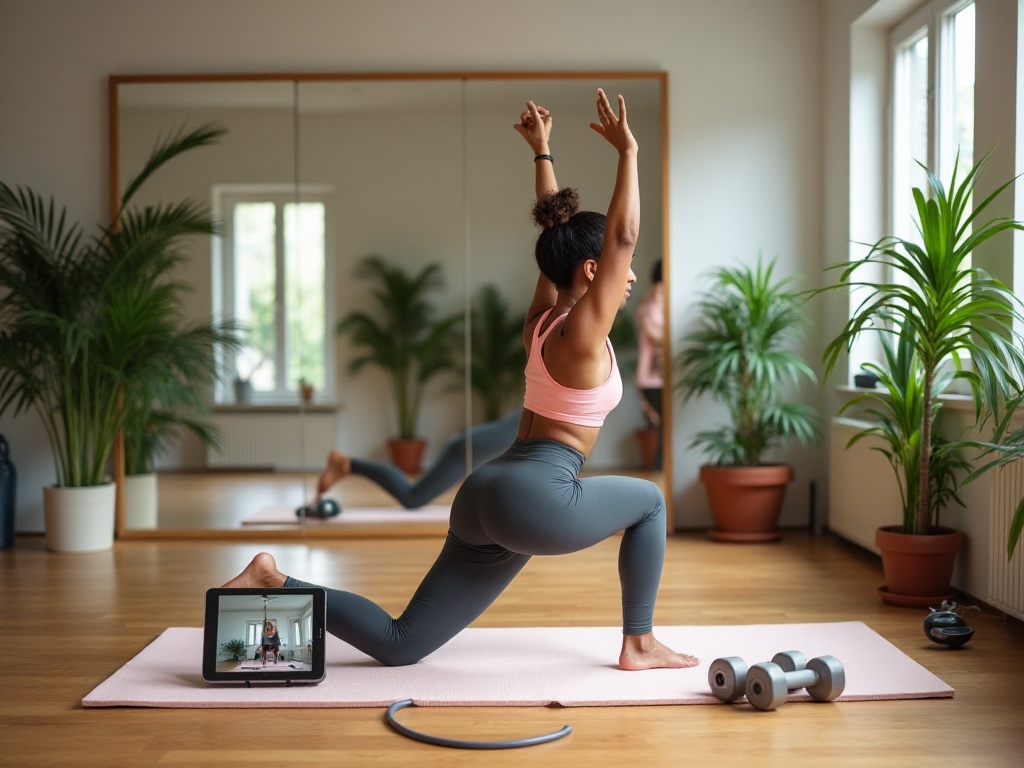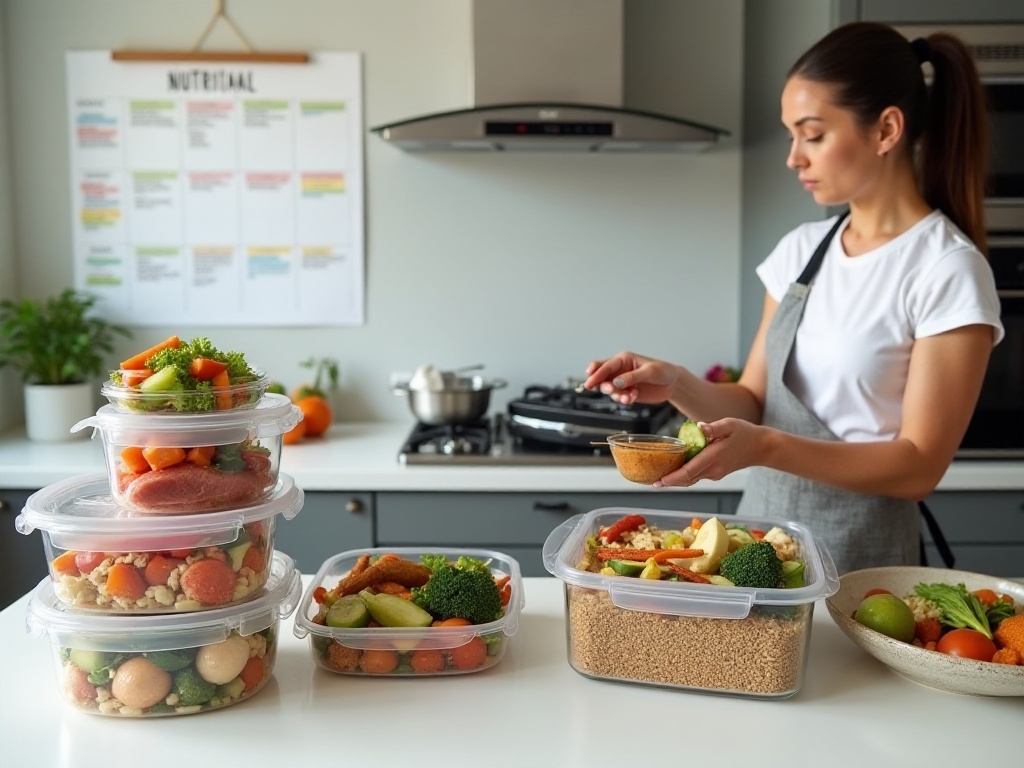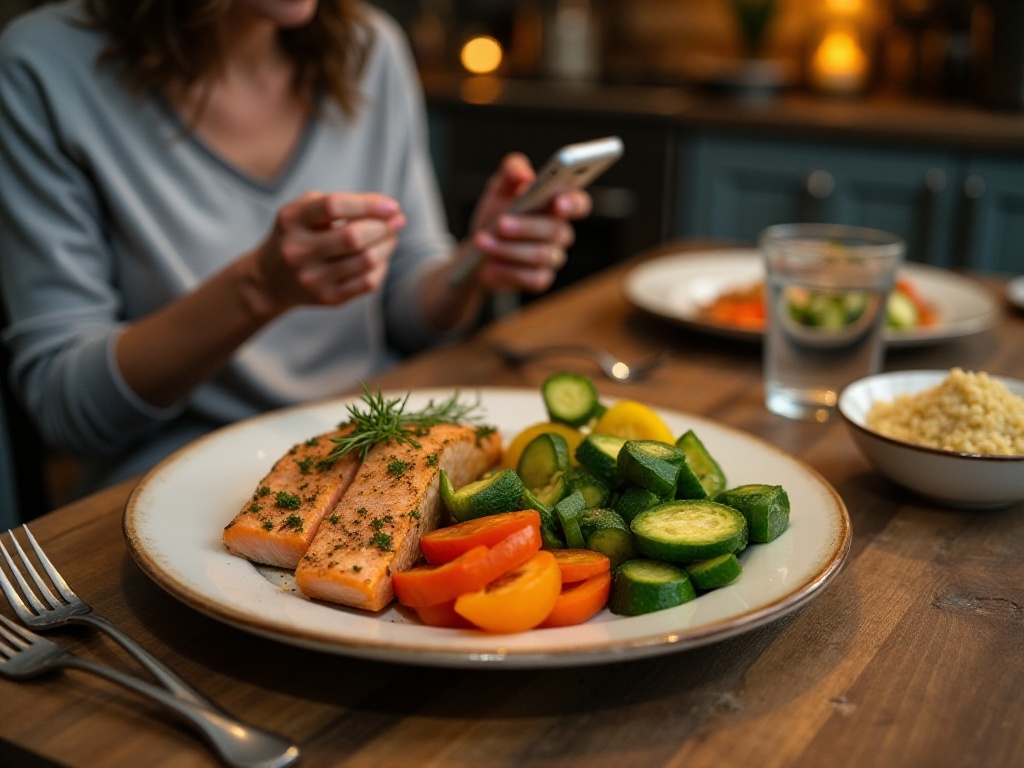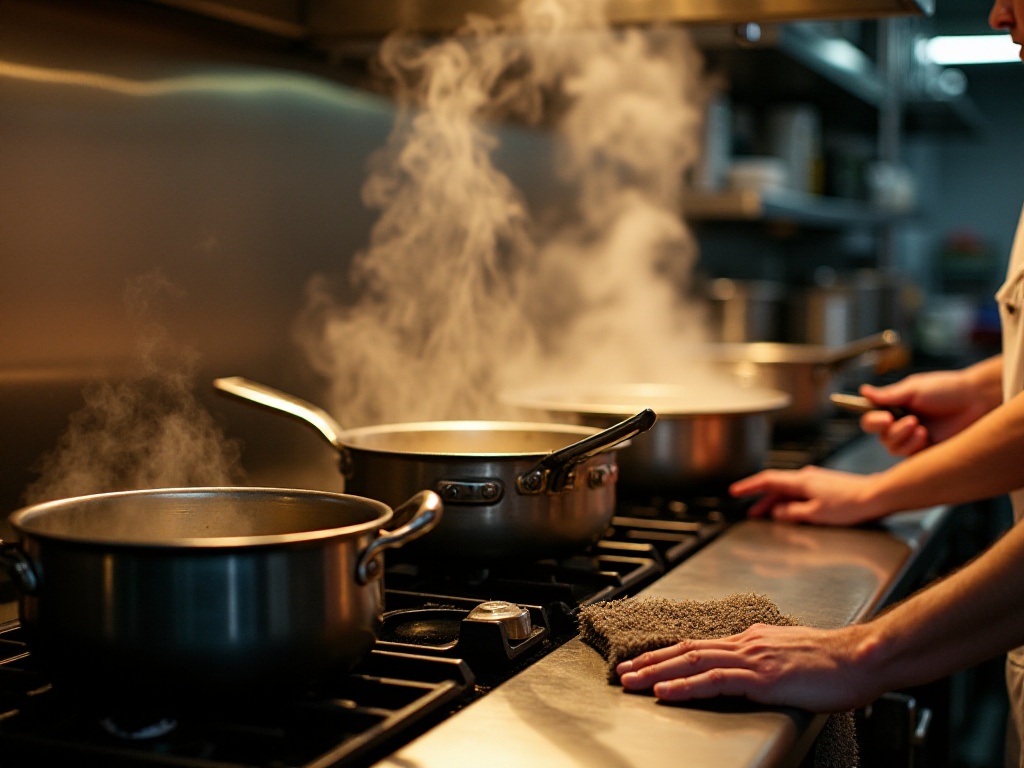
Introduction
Recently, I've received many messages from friends asking how I manage to stay so healthy while living alone in a big city. Indeed, when living alone, it's easy to fall into a cycle of takeout food or irregular meals. In the fast-paced urban life, many young people often neglect their health for work and career. I've been through those hazy days when I was too busy even to eat, let alone maintain a regular schedule. But after a period of adjustment and exploration, I finally found a healthy lifestyle that suits me. Today, I'd like to share how to live a healthy and refined life while living alone.
Dietary Revolution
Have you ever wondered why others look so energetic while you always feel listless? The answer lies in our plates. When I first started working, I often had coffee for breakfast and ordered takeout seven or eight times a week. Until one day, I was shocked by my sallow complexion in the mirror, which prompted me to seriously study nutrition.
After diving deep into nutrition, I discovered that healthy eating is far more complex than I imagined. It's not just about simple nutrient combinations, but an art of balance. I started with the most basic dietary habits, like eating at regular times and quantities, giving up junk food, and increasing fruit and vegetable intake. Gradually, I noticed my complexion improving and my energy levels rising.

New Approach to Staple Foods
Many people think they should avoid staple foods to lose weight, which is a big mistake. Quality carbohydrates not only won't make you fat but are an important source of energy. Now I choose whole wheat bread, brown rice, or oats as my staples, which are both filling and healthy.
When choosing staple foods, I pay special attention to whole grain intake. Whole grains not only contain abundant dietary fiber but also provide B vitamins, iron, and other important nutrients. Every morning, I prepare a nutritionally balanced breakfast. My favorite combination is two slices of whole wheat toast + a boiled egg + a handful of nuts + a glass of unsweetened soy milk. This combination provides complex carbs, quality protein, and essential fatty acids - perfect.
Speaking of whole grains, many people might think they don't taste good. Actually, this can be improved through cooking methods. For example, brown rice can be soaked for several hours before cooking to become softer and more palatable. Oats can be made into overnight oats with fruits, nuts, and yogurt, making them both delicious and nutritious.
I particularly enjoy making whole wheat bread. Although it requires some time investment, homemade bread allows control over ingredients and ensures freshness. On weekends, I use a bread machine to knead the dough, then bake it in the oven. The whole room fills with the aroma of bread, creating a sense of happiness that takeout can't replace.
The Art of Fruits and Vegetables
When it comes to healthy eating, getting enough fruits and vegetables daily is absolutely crucial. Nutrition experts recommend eating 5 servings of fruits and vegetables daily - sounds like a lot, right? Actually, one serving isn't that much; an apple counts as one serving, as does a bowl of lettuce salad.
When choosing fruits and vegetables, I pay special attention to color combinations. Different colored produce contains different nutrients - for example, dark green broccoli is rich in folic acid, red tomatoes are full of lycopene, and orange carrots contain lots of beta-carotene. I try to make my plate as colorful as a rainbow.
To make vegetables more delicious, I've studied many cooking methods. For example, broccoli can be blanched then quickly stir-fried to maintain its crisp texture while preserving nutrients. Spinach is best made into salads, paired with nuts and fruits for great texture. As for fruits, I like to cut them into small pieces and keep them in the refrigerator for easy access.
I've also developed the habit of drinking a glass of fruit and vegetable juice daily. But note that it's better to choose freshly squeezed juice rather than packaged ones. I combine various fruits and vegetables, like apple + carrot + ginger, which is not only delicious but also provides rich vitamins and minerals.

Protein Choices
When it comes to balanced nutrition, protein intake is also very important. As a woman living alone, I particularly like choosing protein sources that are easy to store and cook. Eggs are a great choice - they're not only nutritious but also versatile in cooking. I often boil several eggs and keep them in the refrigerator as snacks or breakfast sides.
Bean products are also good protein sources. Tofu, dried tofu, and soy milk are my staple ingredients. Tofu can be made into mapo tofu or stewed tofu, while dried tofu can be diced and stir-fried with vegetables - all make great accompaniments to rice. These ingredients are affordable and have a relatively long shelf life, perfect for solo living.
Fish is also highly nutritious, especially deep-sea fish rich in omega-3 fatty acids. I usually buy fresh fish at the market on weekends and freeze them in small portions. This way, I can just take out one portion when I want to eat. Steamed fish is the simplest cooking method that best preserves nutrients - just add some ginger and green onions for a healthy and delicious meal.

The Wisdom of Seasoning
Speaking of cooking, seasoning is also a profound art. Many people think healthy eating means bland food, but this is a misconception. Proper seasoning not only makes food more delicious but also helps the body better absorb nutrients.
I keep several natural seasonings in my kitchen, such as ginger, garlic, green onions, Sichuan peppercorns, and star anise. These seasonings not only add flavor but also have health benefits. For example, ginger warms the stomach and dispels cold, while garlic has antibacterial and anti-inflammatory properties.
Regarding oils, I mainly use olive oil and tea seed oil. Olive oil is suitable for cold dishes and low-temperature cooking, while tea seed oil is good for stir-frying. Both contain beneficial unsaturated fatty acids. Additionally, I keep some nut oils, like walnut oil, which work great in salad dressings or noodle dishes.

The Way of Life
About Weight
Honestly, I completely understand many women's anxiety about weight. But I want to say that weight isn't the only measure of health. I now weigh myself once a week but focus more on changes in my body condition rather than specific numbers.
Through this process, I gradually understood that a healthy weight is a range, not a fixed number. Many factors affect weight, including muscle mass, water content, and hormone levels. Rather than obsessing over numbers, it's better to focus on overall indicators like mental state, skin condition, and physical fitness levels.
I now use a health journal to record weekly weight, exercise amount, sleep quality, and other information. Through these records, I can better understand my physical condition and adjust my lifestyle accordingly. For example, if I notice recent weight gain, I'll check if I've reduced exercise or consumed too many high-calorie foods.
New Thoughts on Exercise
When mentioning exercise, many people's first reaction is: what a hassle. But I want to tell you that 150 minutes of exercise per week isn't as daunting as it sounds. I break it down into 30 minutes daily, which could be morning yoga, after-work brisk walking, or a weekend dance class.
Exercise doesn't necessarily require going to the gym; home workouts are also great. I have some simple exercise equipment at home, like a yoga mat, resistance bands, and small dumbbells. Every morning after waking up, I do 15 minutes of stretching exercises, which helps quickly wake up my body and prepare for the day's work.
After work in the evening, if the weather is nice, I like walking in the neighborhood. Walking while listening to music or podcasts both relaxes the mind and achieves exercise goals. On weekends, I join exercise classes with friends, like yoga, Pilates, or dance. This not only maintains exercise motivation but also helps meet like-minded friends.
In the exercise process, I pay special attention to the principle of gradual progress. When starting exercise, I choose relatively gentle forms like brisk walking or light yoga. As fitness improves, I gradually increase intensity and duration. This not only prevents exercise injuries but also allows the body to better adapt to exercise habits.
Schedule Adjustment
Good sleep patterns are also an important part of healthy living. I now maintain a habit of sleeping before 11 PM and waking up at 7 AM. Although adjusting sleep patterns may feel difficult at first, after persisting for a while, you'll find that regular sleep patterns can make you energetic and improve work efficiency.
To ensure sleep quality, I stop using electronic devices an hour before bed, switching to reading physical books or doing light stretching exercises. Drinking a cup of warm honey water or chrysanthemum tea before bed can also help relax body and mind. Additionally, I ensure appropriate bedroom temperature and humidity, using blackout curtains to create a good sleep environment.
Mental Health
While pursuing physical health, mental health is equally important. Although living alone offers freedom, it can sometimes feel lonely. I've learned many self-regulation methods, such as meditation, journaling, and listening to music. These methods help maintain psychological balance and reduce stress and anxiety.
I've also developed a habit of setting aside "alone time" every day. This time can be used for reflection, planning, or simply doing nothing, just sitting quietly. This solitude helps me better understand myself and how to care for my physical and mental needs.
Life Details
The Science of Drinking Water
I once read an interesting study saying that the body's thirst signals are often mistaken for hunger. In other words, when you feel hungry, you might just be thirsty. I now always keep a water cup on my desk, taking sips from time to time, which both maintains hydration and controls appetite.
To ensure regular water intake, I set drinking water reminders at different times. For example, drinking warm water after waking up helps wake up the digestive system; appropriate hydration before and after exercise; drinking water half an hour after lunch aids digestion; and having the last glass of water an hour before bed to avoid affecting sleep.
I also particularly enjoy making herbal teas, like rose tea, chrysanthemum tea, and chamomile tea. These teas not only provide hydration but also have different health benefits. When preparing these teas, I pay attention to water temperature and steeping time to maximize the retention of nutrients and flavor.
Dietary Advice
Many people ask me whether they should take nutritional supplements. My advice is: if your diet is sufficiently balanced, you probably don't need them. However, considering the high work pressure of modern life, if you feel your nutritional intake is insufficient, appropriate supplementation under medical guidance is acceptable.
When choosing ingredients, I particularly focus on seasonality. Seasonal produce is not only fresh and delicious but also relatively affordable and better suited to the body's physiological needs. For example, eating more cooling fruits in summer, while choosing warming ingredients in winter.
Additionally, I pay attention to food storage methods. I store different types of ingredients separately, regularly check vegetables and fruits, and promptly handle any spoiled portions. I label purchase dates on refrigerated items to better control ingredient freshness.
Kitchen Organization
A clean and organized kitchen makes cooking more enjoyable. My kitchen has different storage areas, clearly categorized into dry goods, seasonings, and utensils sections. This not only makes cooking more smooth but also prevents food waste.
I regularly check and clean kitchen items to ensure all utensils remain clean and hygienic. When buying kitchen tools, I choose practical and easy-to-clean products to reduce daily maintenance work.

Final Words
A healthy lifestyle sounds simple, but truly sticking to it requires great willpower. However, please believe me, when you really start valuing your body, you'll find it's all worth it. Life should be a beautiful adventure, and a healthy body is our best capital for exploring this world.
In this pursuit of health, the most important thing is finding what works for you. Everyone's physique and lifestyle habits are different, so don't blindly follow others' methods. Learn to listen to your body and make adjustments based on your situation.
Remember, healthy living isn't a short sprint but a process requiring persistence. It needs us to accumulate small changes in daily life, which will eventually lead to qualitative leaps. Let's work together, take responsibility for our bodies, and strive for a better life.
What have you been doing for your health lately? Feel free to share your story in the comments.
Next
Life Hacks: 50 Home Living Tips You Might Not Know About to Make Your 2025 Easier and More Fun
A comprehensive guide exploring life hacks, their core definition, and practical applications in household management and daily life optimization, offering accessible methods to improve efficiency and solve everyday challenges
Super Practical Home Tips I've Summarized from 1,000 Life Hacks - Easy to Learn
A systematic exploration of life hack categories and applications, covering daily convenience techniques, household cleaning, kitchen food preparation, analyzing their cost-effective characteristics and distribution across various platforms
These Super Practical Home Management Tips Will Boost Your Life Efficiency by 300%
A comprehensive guide to practical life hacks covering home organization, food preservation, and cleaning maintenance, including storage solutions, food saving methods, and daily cleaning tips for improving home life quality and efficiency
Next

Life Hacks: 50 Home Living Tips You Might Not Know About to Make Your 2025 Easier and More Fun
A comprehensive guide exploring life hacks, their core definition, and practical applications in household management and daily life optimization, offering accessible methods to improve efficiency and solve everyday challenges

Super Practical Home Tips I've Summarized from 1,000 Life Hacks - Easy to Learn
A systematic exploration of life hack categories and applications, covering daily convenience techniques, household cleaning, kitchen food preparation, analyzing their cost-effective characteristics and distribution across various platforms

These Super Practical Home Management Tips Will Boost Your Life Efficiency by 300%
A comprehensive guide to practical life hacks covering home organization, food preservation, and cleaning maintenance, including storage solutions, food saving methods, and daily cleaning tips for improving home life quality and efficiency

